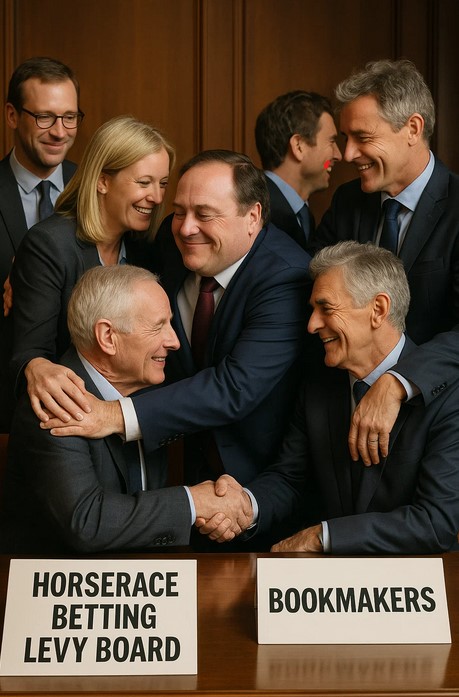Bookmakers’ Windfall, Racing’s Wasteland: How the BHA and Levy Board Traded Sport for Profit
With betting turnover collapsing and punters abandoning post, British racing’s record levy is less a triumph and more the symptom of a rigged ecosystem—bankrolled by casual losses and endorsed by those meant to protect the sport.
Ed Grimshaw
5/15/20253 min read


This year, the Levy Board is celebrating a record £108 million yield like it’s won the Gold Cup itself, only without the sweat, silks or spectators. But beneath the banner headline lies a figure they’ve conveniently tiptoed around: turnover on British racing is down 8% on the year, 19% since 2021–22.
That’s not a bump in the road. That’s a full-scale retreat.
Meanwhile, in the first three months of 2025, betting turnover dropped another 9% year-on-year. And while the BHA clutches to the mirage that “Premier fixtures are stable,” the foundation beneath is rotting: core meeting turnover has collapsed by 14.4%.
So how, in this cratering ecosystem, are we looking at record levy receipts?
The answer is as obvious as it is damning: punters are losing more money, more quickly, from a shrinking pool of activity. Racing is being sustained by large-scale, margin-rich defeats on the big festivals—particularly Cheltenham, where this year the favourites fell like dominoes in a Wetherspoons bar fight.
The Cheltenham Con: A Bookmaker's Harvest, a Sport's Mirage
Constitution Hill, Jonbon, Teahupoo, Galopin Des Champs. All turned over. A bloodbath for the casual punter. A bumper harvest for the layers. It’s no accident that this year’s levy exceeded even the Levy Board’s own forecast of £100 million by a tidy £8 million.
But let’s be clear: this isn’t prosperity. It’s extraction.
The levy model now rewards gross profit, not turnover. So a festival littered with short-priced losers, backdoored accumulators and empty pockets means higher levy, regardless of participation. In fact, the more catastrophic the punter’s week, the better it looks on the Levy Board’s balance sheet.
It’s become the financial equivalent of burning your customer base for kindling, then calling it sustainable heating.
What the BHA Won’t Admit
The BHA continues to cite affordability checks, anti-money laundering protocols, and restrictions as unfortunate externalities—rather than what they really are: an unforced error of governance.
Let’s call it what it is: institutional appeasement of bookmakers. The BHA has bent over backwards to accommodate government pressure on gambling reform without defending the basic principle that adult punters should be able to bet without financial interrogation.
Instead, we now have a system where:
High-staking punters have walked;
Smart money is stifled or restricted;
Recreational money is algorithmically preyed upon;
And black market operators are thriving in the shadows.
Bookmakers, of course, are doing just fine—particularly with races that now resemble 20-runner traps built for the house, not the punter. Restrictions, delays, bans, and affordability hurdles now form a moat between liquidity and participation—a moat the BHA helped dig, shovel by shovel.
And the Levy Board? It watches this exodus and calls it a strong year.
The Most Expensive Bingo Hall in Europe
So, let’s be honest: if turnover is collapsing and profits are rising, what is British racing now?
It’s not a mass-market, skill-based betting ecosystem. It’s certainly not a price-efficient market for informed punters. It’s becoming a curated entertainment product, one that behaves increasingly like bingo on turf—dependent on casual losses, fixed-margin markets, and the steady evacuation of anyone who bets with intent.
The most damning part? It’s not an accident. It’s by design.
The current regime—Levy Board, BHA, and compliant major racecourses—have built an ecosystem where the product is built not to entertain or compete, but to harvest. And they’ll keep harvesting until the soil gives out.
Because this model doesn't need crowds. It doesn’t need new owners or a vibrant middle tier. It just needs enough mugs left to lose on the festivals and enough high-margin filler content to pad the year.
And Where Does the Money Go?
The £108 million? We’re told some of it will go into prize-money, some into facility improvements (with racecourses invited to apply for loans to fix their weighing rooms), and £11 million into mysterious “non-racing fixture grants”.
But where’s the structural reinvestment? Where’s the strategy to rebuild the betting ecosystem that’s collapsing beneath the margins? Where’s the plan for integrity, liquidity, or attracting new blood who don’t come via an alcohol-sponsored stag-do at Aintree?
All we hear is "prudence". Reassurance. And the quiet sound of a cash reserve being stockpiled for a future they know will be worse.
Time for Accountability
British racing doesn’t need another bumper levy. It needs governance that values participation over profit. That understands turnover is the sport’s lifeblood, not a nostalgic metric to be mentioned in regretful footnotes. It needs leadership with the guts to confront bookmakers—not just nod and smile at “voluntary consultations” that never conclude and reforms that never materialise.
Because here’s what happens when you chase yield over sustainability: you lose the sport. Quietly. By attrition. The smart punters leave. The recreational ones dry up. And one day, you wake up with record levy receipts and no sport to spend them on.
Congratulations to the house. But the house, we must remember, doesn’t care who built it.
The question now is whether the rest of us do.
